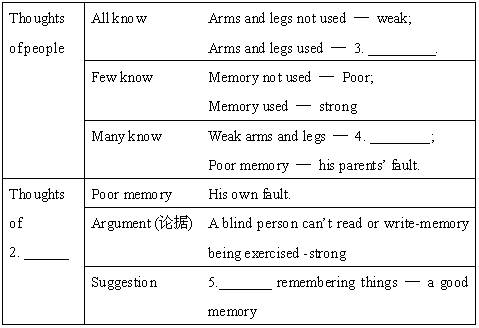阅读下面短文,根据所读内容在文后第66至第70小题的空格里填上适当的单词或短语。
注意:每空不超过3个单词。
As we all know, if you don't use your arms or your legs for some time, they will become weak; when
you start using them again, they slowly become strong again. Everyone knows that. Yet many people do
not seem to know that memory works in the same way. When someone says that he has a good memory,
he really means that he keeps his memory in practice by using it.
When someone says that his memory is poor, he really means he does not give it enough chance to
become strong.
If a friend says that his arms and legs are weak, we know that it is his fault (过错). But if he tells us
that he has a poor memory, many of us think that their parents are to blame (怪责), and few of us know
that it is just his own fault.
Have you ever found that some people can't write or read (blind people) but they have better memories?
This is because that they can't read or write and they have to remember things. They cannot write them
down in a small notebook. They have to remember days, names, songs or stories, so their memories are
being exercised the whole time. If we want to have a good memory, we should practise remembering
things.
Title: How to Have 1. __________

1. A Good Memory 2. the writer 3. strong 4. his own fault 5. Practise
